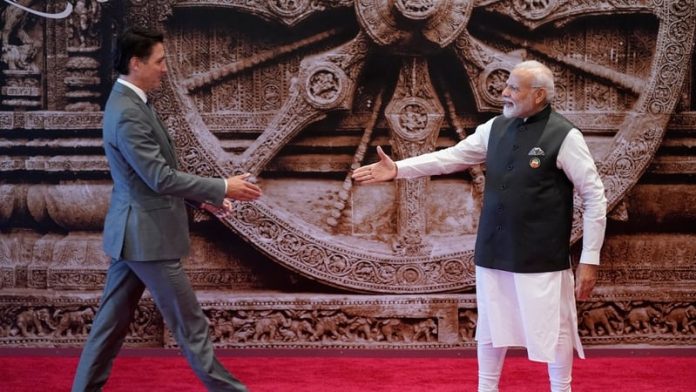As relations between India and Canada hit a historic low, Canadian media and analysts are sharply criticizing Prime Minister Justin Trudeau for making allegations against Indian diplomats without substantiating them with credible evidence. The diplomatic fallout follows Ottawa’s identification of Indian diplomats as “persons of interest” in the investigation into the murder of Khalistani terrorist Hardeep Singh Nijjar.
In a scathing article published by The National Post, senior journalist and author John Ivison argued that Canada has allowed Sikh extremism to “flourish” within its borders. Ivison criticized Trudeau for allowing diaspora politics to influence foreign policy, saying the Prime Minister’s approach has harmed Canada’s international standing. He also called out the Royal Canadian Mounted Police (RCMP) for making serious accusations against India without offering any proof.
The RCMP accused Indian agents of engaging in “serious criminal activity” in Canada, calling it an “extraordinary situation” while dismissing India’s claims of a political smear campaign and accusations that Canada harbors violent extremists. It was a “highly unusual public statement,” calling the allegations “remarkable” given the lack of evidence. “It is very much to be hoped that the RCMP has not allowed itself to be used for such blatantly partisan purposes,” Ivison warned.
Justin Trudeau again fails to provide compelling evidence to the public after escalating tensions with India. The economic risks Canada faces, and that the dispute has escalated to the expulsion of diplomats. This diplomatic rift could cost Canada billions in trade, as the crisis may be driven by political motivations to appease Khalistani ministers like Jagmeet Singh.
In an analysis of the broader implications, the issue goes beyond the Modi government, Khalistanis are separatists, not just opponents of Modi. Critics said that, “This is not what allies do. Canada is aligning itself with separatists, undermining its relationship with India.”
Canada-India Relations Plummet
Canada’s interests are not served by being at odds with New Delhi, like in recent instances where Sikh extremism went unchecked—such as a 2023 parade in Toronto featuring a float glorifying the assassination of former Indian Prime Minister Indira Gandhi.
The India-Canada crisis, simmering for the past 18 months, erupted in September 2023 after Canadian Prime Minister Justin Trudeau accused “agents” of Delhi of being involved in Nijjar’s killing, claiming “credible information” had been shared with intelligence partners, including the U.S. However, India has stated that it has not been presented with evidence to support these charges.
The September accusation led to tensions that included a fierce response from the Indian side, including Prime Minister Narendra Modi, and a tit-for-tat expulsion of diplomats. This week, relations soured further after the RCMP claimed that Indian government “agents” had colluded with organized criminal elements, particularly the Lawrence Bishnoi gang, to “target (Canada’s) South Asian community… specifically pro-Khalistani elements.”
Following these claims, Trudeau held a press conference backing the police charges and criticized what he termed a “fundamental error”—that India thinks it can “engage in supporting criminal activity against Canadians, here on Canadian soil.” He asserted that Canadian police had spoken to Indian government officials but had been rebuffed.
The Canadian federal police’s claims resulted in another round of diplomats being expelled from both sides; this time, Ottawa identified India’s High Commissioner, career diplomat Sanjay Kumar Verma, as a ‘person of interest’ in an ongoing criminal investigation and removed him. In retaliation, India expelled Canada’s acting High Commissioner, Stewart Wheeler, and five of his staff while formally recalling Verma and his team over security concerns.
Nijjar, the mastermind behind the banned terror outfit Khalistan Tiger Force, was on Delhi’s list of ‘most wanted’ terrorists for multiple crimes, including the murder of a Hindu priest in Punjab. The National Investigation Agency (NIA) had offered a ₹10 lakh reward for information leading to his capture.

